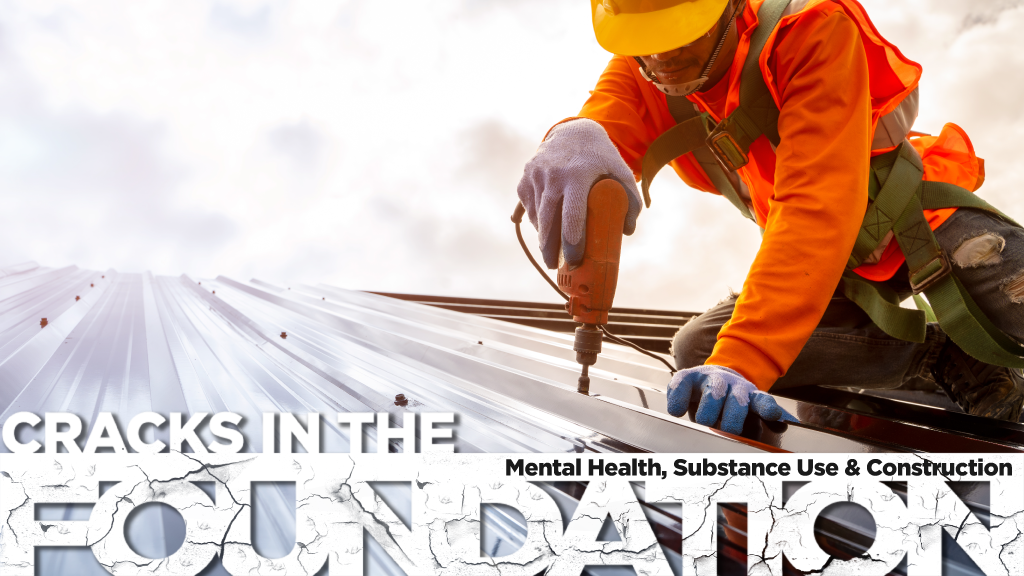Part two of Cracks in the Foundation: Mental Health, Substance Use and Construction, highlights the impacts of living with mental health and substance use issues firsthand through initiatives and personal, gripping stories from frontline workers. They venture to the site, often carrying a heavy burden and not knowing where to turn for help. This series delves into their stories, how they have persevered and what they hope can be learned from their experiences.
This article tells Stuart Simpson’s story and how he now teaches apprentices the importance of taking care of their own mental health.
Apprentices training to become qualified sheet metal workers at Ottawa’s Smart Local 47 Training Centre enter the trade knowing full well the job is physically demanding.
The job description posted on the Local 47 website informs them that sheet metal work involves assembling ductwork – shearing, forming, fabricating and welding a host of items made from galvanized iron, steel, copper and aluminum.
But under the guidance of the Local 47 training staff, the apprentices soon learn of the mental demands associated with the trade as well. Early on, training co-ordinator and local vice-president Stuart Simpson and his staff prepare them to deal with the precariousness of a life in construction.
It’s a topic Simpson has special insights on, having gone through a dark time of his own.

“Right off the bat, if you think about what the trades are, we’re the only job that we go into a building and we work ourselves out of work,” Simpson said recently.
“If there’s bad weather or something happens, you don’t work, you don’t get paid, right? So there’s a lot of financial burden. People will go to work where they’re hurt, their body is in pain so they’ll start with painkillers and then it’ll slowly go from there.”
A key resource the apprentices are told about is a Membership Assistance Plan (MAP) that offers counselling and other services for the workers, their spouses and children.
Simpson stresses he is not a counsellor but that he holds himself out as a friend or adviser who is always available to talk or even offer a simple text message to check in.
“I am a friend who has had his own issues. I might be able to understand where they are coming from, but my goal is to talk with them and make them understand just how helpful going for counselling is,” he said. “Professional help will give you the tools to get better, but sometimes all they want is to just talk or vent and I’m OK with that.
“This morning, for example, we were asking if anybody in here has ever been touched by suicide. Of the seven people in the class, six hands went up. They understand that it’s getting worse, and that a union is more than just here to collect your dues, they’re actually here to support you. We’re really preaching that if you reach out to a friend, or call me, I’m going to talk with you.”
Periodically, Simpson, a commanding and confident speaker, will share his own experience with mental health problems and usually he gets a surprised response.
“I say, ‘Yes, I’ve been there too. I went through a very dark time, and it took me a long time to get better. A lot of people have been there.”
Among the tools Local 47 is planning to use to escalate mental health awareness is a program from The Working Mind. Objectives of the course include reducing the stigma around mental illness, helping participants identify poor mental health in themselves and others, and giving participants the coping skills to manage stress and poor mental health.
Simpson believes formal programs such as The Working Mind need to be supplemented by everyday efforts to get to know fellow workers so they can recognize signs in each other that stresses are taking over. Continuing dialogue around mental health will embolden colleagues to reach out when they need help.
“When life starts dealing you one bad hand after another, it is not hard to start down the rabbit hole,” he said. “The hard part is asking for help to get out of that hole. It’s a very slippery slope once you start on it. I didn’t know that there were so many resources out there – had I known, I might have reached out sooner for help.”
Depression can lead to negative self-talk, with the victim not trusting friends and colleagues, Simpson said.
“That’s the hard part, actually talking to someone or asking for help.
“This is one of the reasons I’m an advocate for mental health. We need to remove the stigma surrounding it.”
Simpson said his own path to recovery took a long time but with the support of counselling and his family, he has proved to himself he is resilient. He takes a few minutes each day to practise self-care, which includes cooking and spending time with his family, friends and dogs.
“I have found my self-confidence again. I wake up every day and look forward to the day. I have found joy again in the simple things in life.”
He knows if he finds himself going to a dark place again he can reach out for help, whether it’s with a counsellor in a program like MAP or just calling a friend.
As for his position as a union training co-ordinator, Simpson said, “Having suffered from mental illness myself, I think it makes me that much more aware of others. That is what drives me to promote mental health awareness and make others know about the resources available to them.”
Follow the author on Twitter .











It is so encouraging and inspiring to hear and see the progress in the way mental health is viewed. Too often men are seen as the financial contribution to the family unit, when we need to acknowledge them as an integral important emotional contributer. It’s too much pressure, for one person to carry. We’ve raised our boys to be tough, in total control, problem solvers, task masters, protectors and bread winners. This viewpoint and expectation has a detrimental effect on the men who don’t feel like they live up to these standards. Self imposed standards, and societal ones. It is no wonder the rate of suicide, substance use disorder and self sabotage is at an all time high. Let’s release this pressure valve by letting the men in our lives be vulnerable, feel safe to share their stories and fears. This only happens when we learn that our flaws, hard edges, soft spots, fears, dreams and desires are what keeps us connected as humans. I am grateful to tge incredible people who elevate our brothers and sisters, to express themselves, and reach out. Courage and dignity…it’s a give and take.